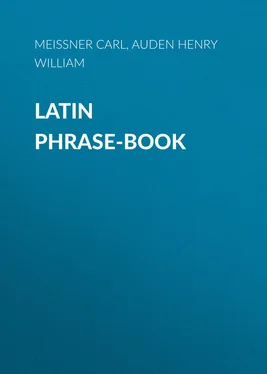Carl Meissner - Latin Phrase-Book
Здесь есть возможность читать онлайн «Carl Meissner - Latin Phrase-Book» — ознакомительный отрывок электронной книги совершенно бесплатно, а после прочтения отрывка купить полную версию. В некоторых случаях можно слушать аудио, скачать через торрент в формате fb2 и присутствует краткое содержание. Жанр: foreign_antique, foreign_prose, на латинском языке. Описание произведения, (предисловие) а так же отзывы посетителей доступны на портале библиотеки ЛибКат.
- Название:Latin Phrase-Book
- Автор:
- Жанр:
- Год:неизвестен
- ISBN:нет данных
- Рейтинг книги:5 / 5. Голосов: 1
-
Избранное:Добавить в избранное
- Отзывы:
-
Ваша оценка:
- 100
- 1
- 2
- 3
- 4
- 5
Latin Phrase-Book: краткое содержание, описание и аннотация
Предлагаем к чтению аннотацию, описание, краткое содержание или предисловие (зависит от того, что написал сам автор книги «Latin Phrase-Book»). Если вы не нашли необходимую информацию о книге — напишите в комментариях, мы постараемся отыскать её.
Latin Phrase-Book — читать онлайн ознакомительный отрывок
Ниже представлен текст книги, разбитый по страницам. Система сохранения места последней прочитанной страницы, позволяет с удобством читать онлайн бесплатно книгу «Latin Phrase-Book», без необходимости каждый раз заново искать на чём Вы остановились. Поставьте закладку, и сможете в любой момент перейти на страницу, на которой закончили чтение.
Интервал:
Закладка:
4. Coming – Going
pedibus ire – to go on foot.
discedere a, de, ex loco aliquo – to leave a place.
egredi loco ; 24 24 relinquere , e.g. domum , properly means to give up, renounce the possession or enjoyment of a place.
excedere ex loco – to leave a place.
decedere loco, de, ex loco 25 25 Cf. especially decedere (ex, de) provincia , used regularly of a magistrate leaving his province on expiry of his term of office. Similarly, where life is compared to a province, decedere (de) vita , or merely decedere = to quit this life, die (cf. De Sen. 20. 73).
– to quit a place for ever.
ingredi, intrare urbem, introire in urbem – to enter a city.
portā ingredi, exire – to go in at, go out of a gate.
extra portam egredi – to go outside the gate.
commeare ad aliquem – to go in and out of any one's house; to visit frequently.
Romam venire, pervenire – to come to Rome.
adventus Romam, in urbem – arrival in Rome, in town.
in unum locum convenire, confluere – to collect together at one spot.
Romam concurrere (Mil. 15. 39) – to stream towards Rome.
obviam ire alicui – to meet any one.
obviam venire alicui – to go to meet some one.
obvium or obviam esse, obviam fieri – to meet some one by chance.
incidere in aliquem – to meet, come across a person; to meet casually.
offendere, nancisci aliquem – to meet, come across a person; to meet casually.
obviam alicui aliquem mittere – to send to meet a person.
5. Riding – Driving
curru vehi, in rheda (Mil. 21. 55) – to drive.
equo vehi – to ride.
sternere equum – to saddle a horse.
conscendere equum – to mount.
ascendere in equum – to mount.
descendere ex equo – to dismount.
in equo sedere; equo insidēre – to be on horseback.
(in) equo haerere – to sit a horse well; to have a good seat.
calcaria subdere equo – to put spurs to a horse.
calcaribus equum concitare – to put spurs to a horse.
equo citato or admisso – at full gallop.
freno remisso; effusis habenis – with loose reins.
equum in aliquem concitare – ride against any one at full speed; charge a person.
habenas adducere – to tighten the reins.
habenas permittere – to slacken the reins.
admittere, permittere equum – to give a horse the reins.
frenos 26 26 Cf. frenos, calcaria alicui adhibere , used metaphorically.
dare equo – to give a horse the reins.
agitare equum – to make a horse prance.
moderari equum – to manage a horse.
equi consternantur – the horses are panic-stricken, run away.
equos incitatos sustinere – to bring horses to the halt when at full gallop.
6. Walking – Footsteps – Direction
gradum facere – to take a step.
gradum addere (sc. gradui ) (Liv. 26. 9) – to increase one's pace.
suspenso gradu – on tiptoe.
gradum sensim referre – to retreat step by step.
vestigia alicuius sequi, persequi or vestigiis aliquem sequi, persequi – to follow in any one's steps.
vestigiis alicuius insistere, ingredi (also metaph.) – to follow in any one's steps.
loco or vestigio se non movere – not to stir from one's place.
recta (regione, via); in directum – in a straight line.
in obliquum – in an oblique direction; sideways.
obliquo monte decurrere – to run obliquely down the hill.
in contrarium; in contrarias partes – in an opposite direction.
in transversum, e transverso – across; transversely.
quoquo versus; in omnes partes – in all directions.
in diversas partes or simply diversi abeunt, discedunt – they disperse in different directions.
huc (et) illuc – hither and thither.
ultro citroque – on this side and on that; to and fro.
longe lateque, passim (e.g. fluere ) – far and wide; on all sides; everywhere.
7. Movement in General
se conferre in aliquem locum – to go to a place.
petere locum – to go to a place quo tendis? – where are you going?
sublimem or sublime (not in sublime or sublimiter ) ferri, abire – to fly aloft; to be carried into the sky.
praecipitem ire; in praeceps deferri – to fall down headlong.
in profundum deici – to fall down into the abyss.
se deicere de muro – to throw oneself from the ramparts.
deicere aliquem de saxo Tarpeio – to throw some one down the Tarpeian rock.
Nilus praecipitat 27 27 praecipitare is also transitive, e.g. praecipitare aliquem , to hurl a person down; ruere always intransitive except in poetry.
ex altissimis montibus – the Nile rushes down from very high mountains.
se proripere ex domo – to rush out of the house.
humi procumbere – to fall on the ground.
humi prosternere aliquem – to throw any one to the ground.
in terram cadere, decidere – to fall to the earth.
in terram demergi – to sink into the earth.
appropinquare urbi , rarely ad urbem – to draw near to a city.
propius accedere ad urbem or urbem – to advance nearer to the city.
longius progredi, procedere – to march further forward.
Romam versus proficisci – to advance in the direction of Rome.
ad Romam proficisci – to set out for Rome.
properat, maturat proficisci – he starts in all haste, precipitately.
consequi, assequi aliquem – to catch some one up.
praecurrere aliquem (celeritate) – to overtake and pass some one.
post se relinquere aliquem – to overtake and pass some one.
multitudo circumfunditur alicui – a crowd throngs around some one.
per totum corpus diffundi – to spread over the whole body.
8. Time in General
tempus praeterit, transit – time passes.
tempus habere alicui rei – to have time for a thing.
tempus mihi deest ad aliquid faciendum – I have no time to do something.
tempus consumere in aliqua re – to pass one's time in doing something.
tempus terere, conterere (in) aliqua re – to waste time on something.
tempus conferre ad aliquid – to employ one's time in…
tempus tribuere alicui rei – to devote time to anything.
tempus non amittere, perdere – to lose no time.
nullum tempus intermittere, quin (also ab opere , or ad opus ) – to devote every spare moment to…; to work without intermission at a thing.
tempus ducere – to spend time.
aliquid in aliud tempus, in posterum differre – to put off till another time; to postpone.
nihil mihi longius est or videtur quam dum or quam ut – I cannot wait till…
nihil mihi longius est quam (c. Inf.) – nothing is more tiresome to me than…
Читать дальшеИнтервал:
Закладка:
Похожие книги на «Latin Phrase-Book»
Представляем Вашему вниманию похожие книги на «Latin Phrase-Book» списком для выбора. Мы отобрали схожую по названию и смыслу литературу в надежде предоставить читателям больше вариантов отыскать новые, интересные, ещё непрочитанные произведения.
Обсуждение, отзывы о книге «Latin Phrase-Book» и просто собственные мнения читателей. Оставьте ваши комментарии, напишите, что Вы думаете о произведении, его смысле или главных героях. Укажите что конкретно понравилось, а что нет, и почему Вы так считаете.

![Рис Хьюз - Madonna Park[e-book - рассказы]](/books/94285/ris-hyuz-madonna-park-e-book-rasskazy-thumb.webp)










